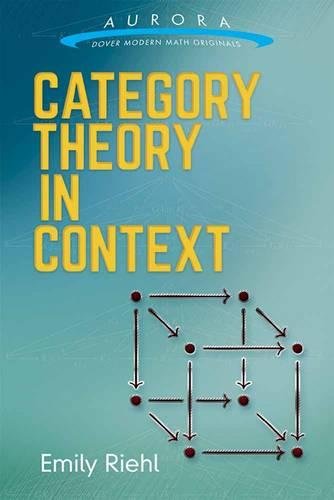
Category Theory in Context
by Emily Riehl
Publisher: Dover Publications 2016
Number of pages: 258
Description:
This concise, original text for a one-semester introduction to the subject is derived from courses that author Emily Riehl taught at Harvard and Johns Hopkins Universities. The treatment introduces the essential concepts of category theory: categories, functors, natural transformations, the Yoneda lemma, limits and colimits, adjunctions, monads, Kan extensions, and other topics.
Download or read it online for free here:
Download link
(1.3MB, PDF)
Similar books
 Notes on Category Theory with examples from basic mathematics
Notes on Category Theory with examples from basic mathematicsby Paolo Perrone - arXiv
These notes were originally developed as lecture notes for a category theory course. They should be well-suited to anyone that wants to learn category theory from scratch and has a scientific mind. There is no need to know advanced mathematics.
(1173 views)
 Seminar on Triples and Categorical Homology Theory
Seminar on Triples and Categorical Homology Theoryby B. Eckmann - Springer
This volume concentrates a) on the concept of 'triple' or standard construction with special reference to the associated 'algebras', and b) on homology theories in general categories, based upon triples and simplicial methods.
(12212 views)
 Toposes, Triples and Theories
Toposes, Triples and Theoriesby Michael Barr, Charles Wells - Springer-Verlag
Introduction to toposes, triples and theories and the connections between them. The book starts with an introduction to category theory, then introduces each of the three topics of the title. Exercises provide examples or develop the theory further.
(15264 views)
 Computational Category Theory
Computational Category Theoryby D.E. Rydeheard, R.M. Burstall
The book is a bridge-building exercise between computer programming and category theory. Basic constructions of category theory are expressed as computer programs. It is a first attempt at connecting the abstract mathematics with concrete programs.
(19426 views)